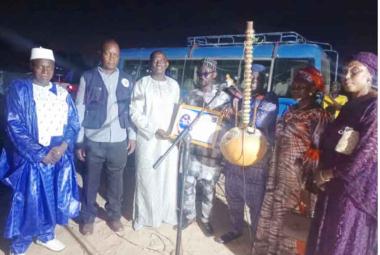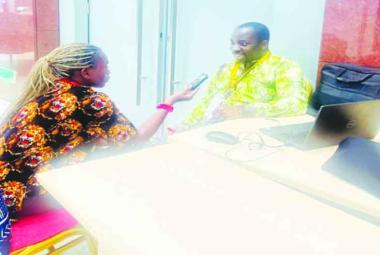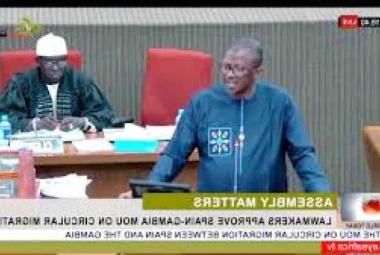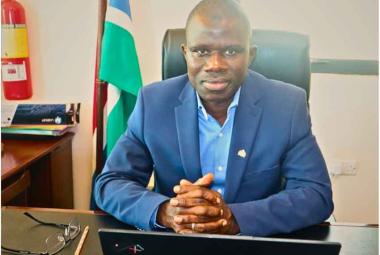By Sarjo M. Camara
This edition of The Exclusive focuses on Gender Based Violence (GBV) and Mr. Falou Sowe, Coordinator of Network Against Gender Based Violence is our guest. In the Q &A, he gives an overview of Gender Based Violence, issues affecting women, misconceptions against women empowerment, and a call to action.
Below is the exchange:
Q: Can we begin by understanding what Gender is before you give an overview of Gender Based Violence?
Gender is the socially constructed roles and responsibilities that are assigned to men or women by a given society or culture.Given the fact that The Gambia is a patriarchal society, we’ve seen the gender roles and norms used as a weapon to perpetuate violence against women and girls. This is why we are advocating ending all forms of gender-based violence, including harmful traditional practices.
Over the past years there is an increase in the overall cases of gender based violence reported at our one-stop centres, and this statistics are also confirmed by the Demographic Health Survey, which also showed that that overall, there is an increase in gender based violence particularly on sexual violence in The Gambia including rape.
There is an emerging trend which is also sexual violence against boys - young males also being raped. This is an alarming issue.We want our society, government, religious and community leaders, women leaders to come together and address this problem.
While gender based violence is generally increasing, there are still so many cases that are under-reported because of the ‘Maslaha’ syndrome. People negotiate cases of violence at family or community levels, and are not reported to authorities.
One of the causes of gender-based violence is culture and social norms like child or forced marriage, FGM or forced wife inheritance. All of these are practices that can promote one form of gender based violence or another, either physically or economically.
The second thing is the power imbalance between male and female. The Gambia is a patriarchal society, where one gender dominates another. There is a high-risk power abuse or misuse that endangers the lives of the others.
Q: Comment on political and economic domination of the female gender
Politically men dominate the political arena, and decision making in general. Therefore most of our policies would be gender bias, as gender issues are not being sensitively addressed. When we look at economic power, the men dominate that arena too.
Q: What do you have to say about the traditional and social power Imbalance?
Men dominate most of the key traditional leadership positions; be it chiefs, the village heads, or even family heads, or religious leadership. The majority of the decision makers at family or community levels are mostly biased towards men. When you also look at the economic power, we have quite a lot of women who are either not employed or are underemployed. As a result they don’t have the economic power to be able to finance their needs and their livelihoods. They depend wholly and solely on their husbands, because the husband has the economic power; they control and micro-manage them. The woman has to accept all that the man imposed on her, because she does not have any economic power.
In a typical Gambian community, you’ll find out that it’s the men that own compounds, houses, and therefore the women are left without that very important livelihood needs that put them at a very disadvantaged position. The man can tell you, “If you don’t do what I want, or if you do not adhere to what I want, you go out of my compound”. Because you don’t own that house or compound, you become vulnerable, your voices cannot stand, and sometimes you face lot of threats, and violence, because you want to continue to stay and have a house where you stay with your children. All of those put women at a disadvantaged position, because they are the ones who are married off from their home to another family, and therefore they can become very vulnerable in that regard.
Q: What would you say about religious misconceptions around wife battering, child marriage, and FGM?
I believe that there are some misconceptions about our religion that our religious leaders have not defined well. Often when it comes to issues that are controversial, like wife bartering, child marriage, FGM, men tend to just take what favours them. For instance, when it comes to marriage and having more wives a lot of them do not adhere to the principles and conditions of polygamy in Islam.
All these things make it very difficult for women because they lack the power, economically, socially, politically and physically; hence they are vulnerable.
I often hear people say “You have laws for child right, women’s right; what about law for men?” You formulate or develop laws and policies to protect those who are vulnerable and at risk of the environment. Government needs to have those laws and policies to protect them; otherwise those who are more powerful, the men, will take advantage of their power and misuse or abuse it. We need policies and laws that will protect the rights and welfare of women and girls for our own good as a society and for the development of our nation.
We have more women and girls than men and boys in our population. Therefore, government and people who are genuine when it comes to development must ensure that the 51 or 52% of our populations are taken care of.
If only 49 or 48% of the population is developed and 52 or 51% are underdeveloped, we can’t develop. We should come up with women empowerment programmes, affirmative action and policies to bridge the gender gaps in different sectors of development.
Q: Why are GBV cases mostly not reported?
First is the culture of silence, which is promoted by the Maslaha syndrome - the belief that we negotiate everything even criminal matters at family or community levels and settle them.
I think there are issues to be negotiated and issues to be dealt with at family and community levels; but there are issues that are beyond family and community levels that need to be dealt with by state agents. Example of such is the issue of rape. We are having cases of rape every day. The saddest thing is most of the victims or survivors of rape are little children, who are raped by adults of above 30 years. We cannot be silenced or negotiate rape cases against little children. It cannot be justified and we shouldn’t accept it as a society.
I urge our communities to break that culture of silence. Don’t say it’s not my child, I don’t know them. Once you know of a case where somebody rapes or abuses a child or a woman, report it; the next victim could be your own child, sister or mother.
Reporting the case doesn’t mean that you want that person to be locked up or to be imprisoned; but it’s only because you want to prevent the occurrence of such happenings and injustice to be done.
That is why the government is working with civil society organisations to have help lines these are 199 and 1330 for GBV cases. These lines are there to protect people who report cases, their identity will be protected. We all know that there are so many sensitive issues that we have divergent opinions on; like FGM. But despite that as Gambians, we should put first the interest of our children and women. We should ensure we bridge the gender gap to achieve the socio-economic development of our country. Any nation that downplays the issues of gender-based violence, gender equity, will not be able to achieve their development goals.
Q: How would you gauge the perception of people towards gender equality activists, and how does it affect your work, and the enforcement of the law?
There are a lot of insults that come our way and towards activists. People curse, and threaten us unnecessarily. It really affects us, and for some of us who are not very strong, it makes you to be silent, and that’s a problem.
I tell my fellow activists that as long as you know that what you are doing is right, carry on; it’s for the betterment of your country, and people. Do not fear to advocate what is right; that’s the only way we can achieve the change that we desire.
Those who insult the activists, I say it doesn’t worth it. It’s better to dialogue and iron out our differences or divergent opinions amicably; rather than threaten people.
We cannot compromise anything that will affect the health of our women and children. Those rights as enshrined in our laws and the international legal obligations that the Gambia is a party to. I urge the law enforcement officers and agencies in the country to ensure that the laws are enforced; especially gender based violence cases in all the forms.






